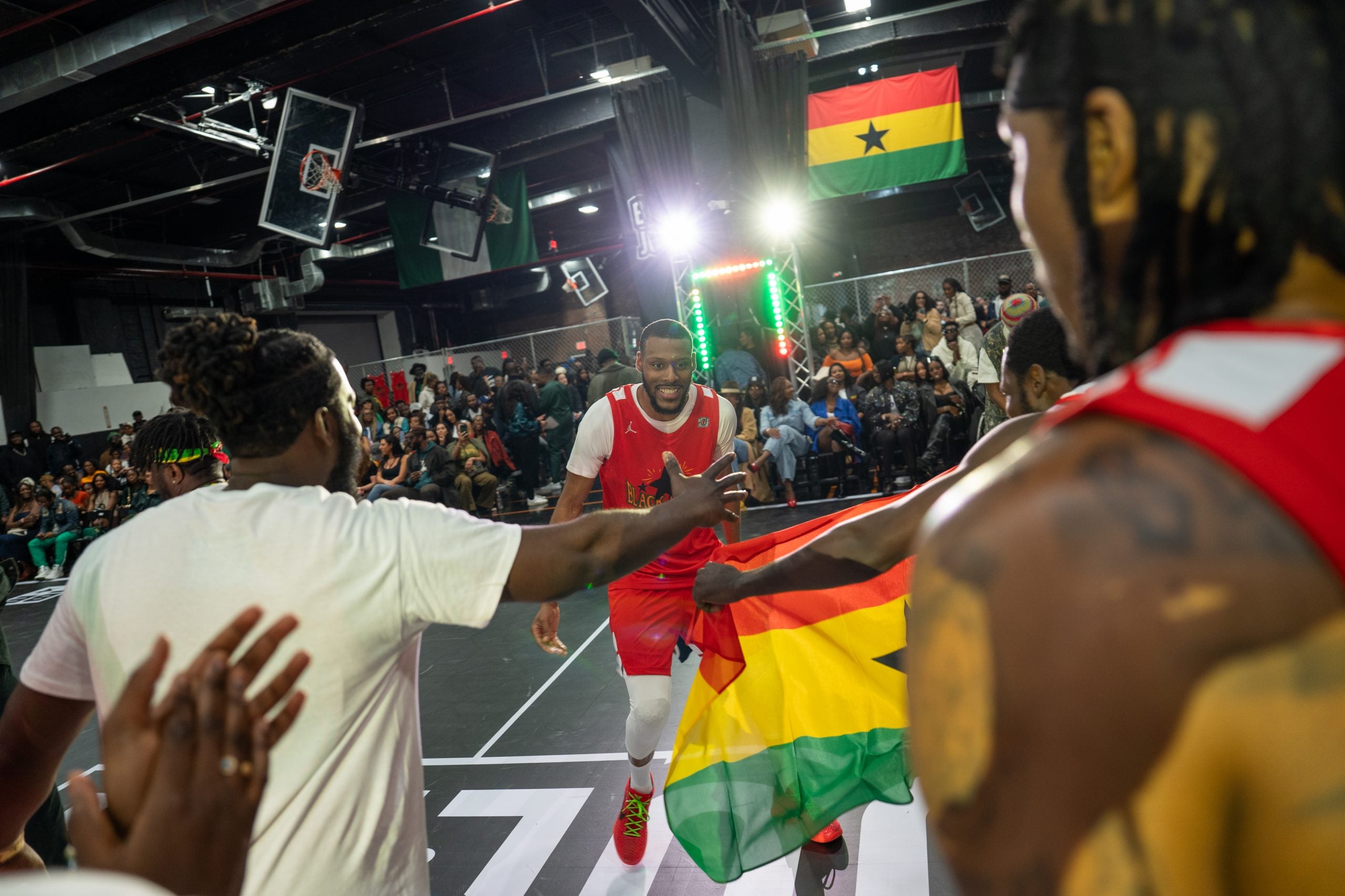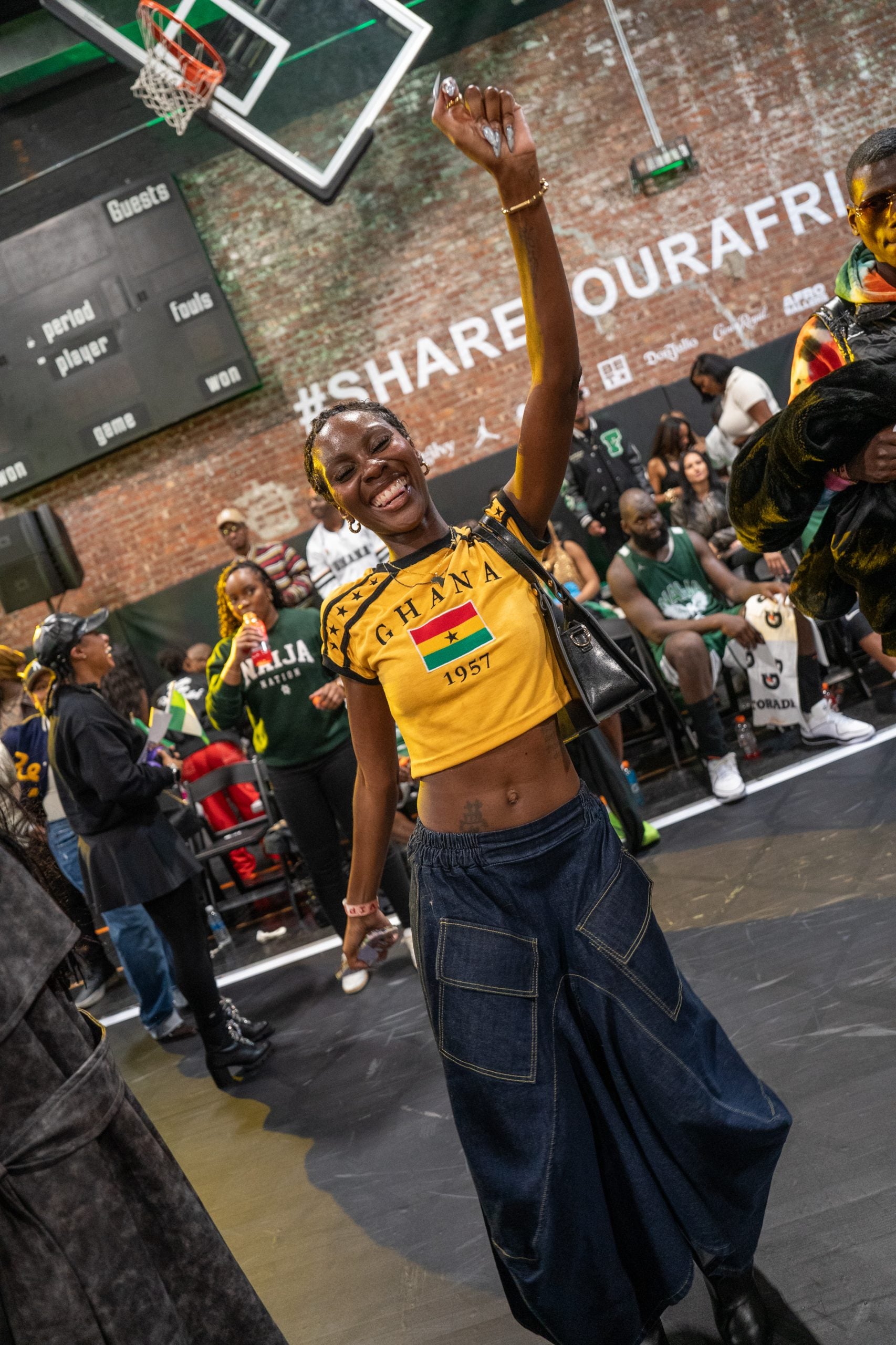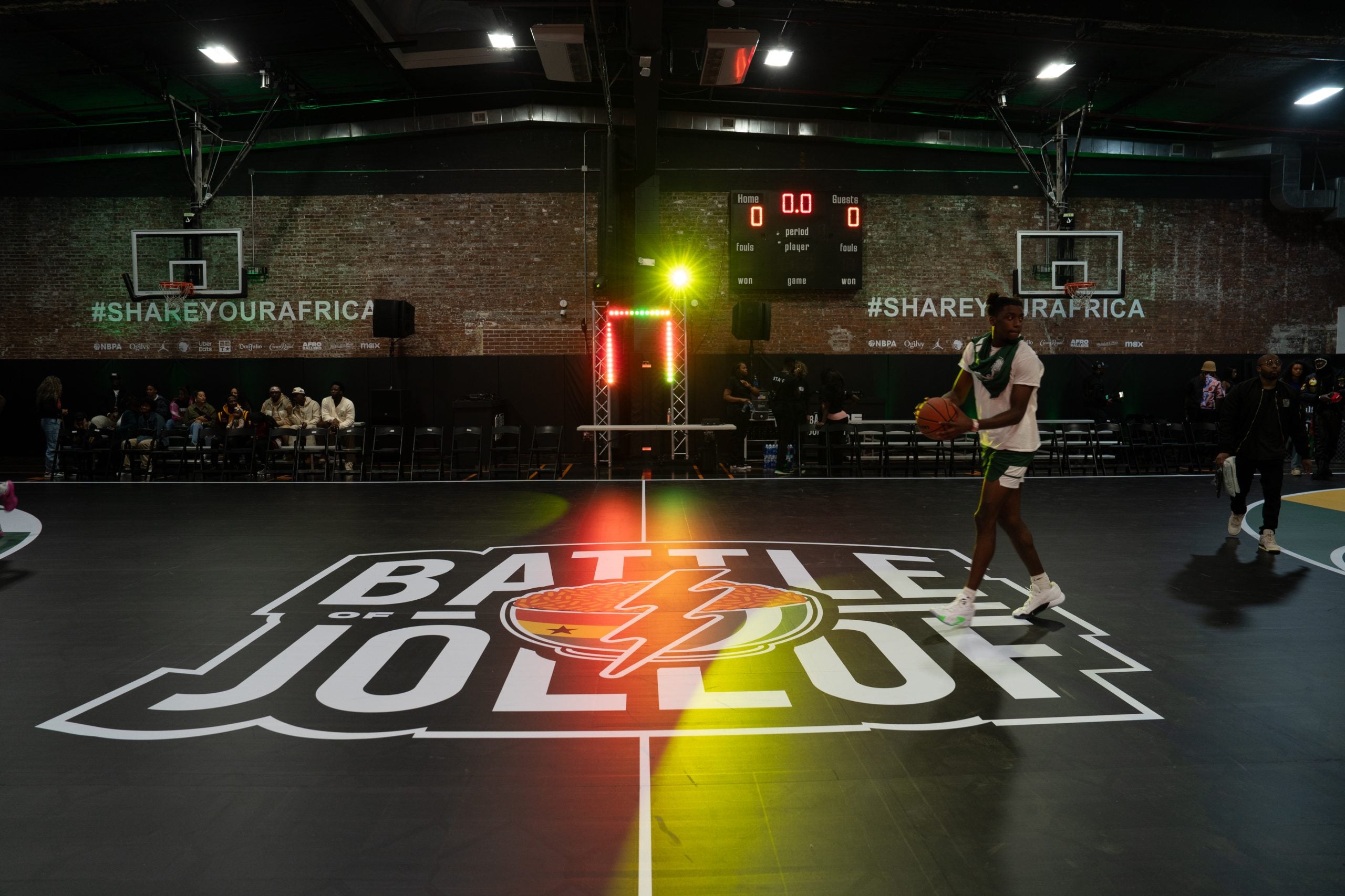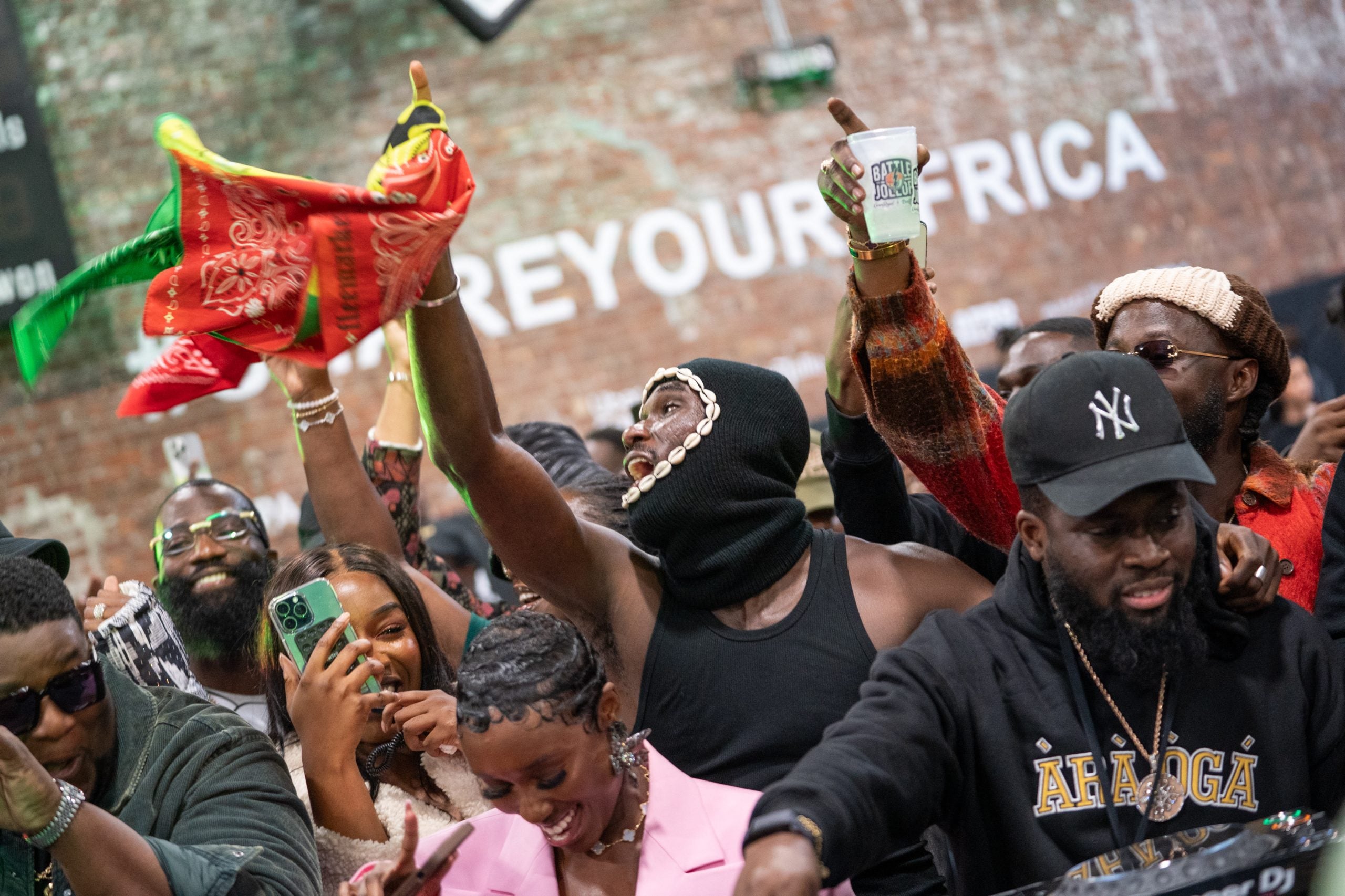
The best in-joke of Atlanta’s third season comes in “White Fashion”, its sixth episode, when Darius (Lakeith Stanfield), the Nigerian-American stoned philosopher, requests jollof for lunch from a white woman tapped into London’s hospitality industry. She is caught off guard by the request, and innocently asks Darius, “It’s Ghanaian, right?” Darius is wrong-footed, offended, and immediately, defensively responds, “No. No. Who told you that?” eyes darting around conspiratorially. The episode was written by the Nigerian-American artist Ibra Ake, who is referencing an ages-old internecine tongue in cheek cultural debate between two proud nations over who makes the best version of the dish that has become a staple of West African cuisine. In Greenpoint, on November 9th, a small sliver of the diaspora once again converged in an indoor gym to celebrate their respective cultures, and wage another battle in a forever war.
The anxieties expressed by that episode of Atlanta, that jollof could one day be colonized (likely responding to this controversy), appropriated and perverted by the American palate, is both funny, and somewhat alarmist, because it happened generations ago. Like red beans and rice and gumbo- other West African dishes that exist as American adaptations in New Orleans- jollof is the ancestor of jambalaya (and perhaps, Spain’s paella and Trinidad’s pilau). It is infinitely adaptable rib sticking soul food, a baked rice dish that actually has its roots in Senegal, where it was known as Thieboudienne (referred to and pronounced colloquially, by everyone I spoke to for this piece, as Chee-boo) then rebranded and promulgated around West Africa by way of the Wolof Empire through its 200 year reign, between the 14th and 16th century.
Today, in America, like America, jollof is very online. Because Ghana and Nigeria are two relatively close (separated by Benin and Togo) English speaking countries that have migrated to the US in large numbers, they are the Montagues and Capulets of American jollof internet discourse, the subject of Drake memes, Tiktoks, and exhaustive Reddit threads parsing out the merits of each “version” of the dish, which can barely be agreed upon in terms of ingredients or recipe steps within any West African country from auntie to auntie, besides of course every person from said country believing their country makes the best jollof. The “rivalry” has served as great PR. The internet loves a silly beef, especially one that reinforces identities, and this one has served to call attention to jollof and the winking divisions within West African American culture.
It’s a fun and fierce form of culinary nationalism that has been capitalized on by Battle of Jollof, an annual event now in its fourth year, created by Arinze Emeagwali, a Nigerian-American Queens bred Howard grad with a background in brand marketing. His vision was to host a cook-off and basketball game, a space for West Africans to celebrate their collective identity and the independent identities therewithin. It’s the meme made flesh, an African cup where countries compete in hoops and food for bragging rights. This year’s event took place inside The Post BK, a sports event space in a refurbished warehouse in Greenpoint near the East River.
“Jollof was just something I ate often growing up, and then I started to understand it’s this thing in the community. When I made friends with Nigerians, it was just a common form of banter, a secret handshake you would bond with someone over instantaneously. The event is a metaphor for how you bring community together through the historical reference of this playful rivalry.” says Yvoire White, an event organizer and proud Ghanaian. “Jollof is something I had to go out and find when I went to college- at a Nigerian restaurant or a Ghanaian restaurant- because my mom was no longer cooking it for me. That’s what it means to be African, or any immigrant.” founder Arinze Emeagwali adds.

Both White and Emeagwali credit a rising consciousness of and appreciation for African culture in America for spurring interest in the event, why now feels like the right time for this sort of celebration. “2019 marked 400 years since the first slaves left Ghana through the Atlantic slave trade, and people have been returning back to Ghana and Nigeria. There’s this entire diaspora of people who have been stepping on the continent for the first time because they’ve seen so many videos on social media, about the energy, the atmosphere and the entertainment. Jollof does a really amazing job democratizing the access, because flights are so expensive right? We’re trying to capture that same energy in a way that’s authentic and to African culture at the intersection of food, sports and music.” White says.
On November 9th, the line outside the event was restless. The attendees on the VIP list were DRESSED- full technicolor dresses and knee high platform boots, decorative iced out open face gold teeth, Knicks Kith collabs and fresh Timbs or JJJJounds, Dodgers hats with “gos” stitched as a suffix on the “LA”- all exceeding my expectations for a night consisting of an amateur basketball game and a cookoff in a gym. It was more a club, or homecoming atmosphere. No one on line thought they belonged there, every party approached the bouncer in front of the venue expecting their contact for the event would get the velvet rope unclipped, all were turned back to wait with the rest of us. Inside, the venue was segmented into several chambers, a half of the gym with a few benches set up around the court for the game, one for a VIP bar and photo station, one for the four tables serving the jollofs in competition.
The basketball game felt like the main event. As DJs spun a rotation of amapiano and Afrobeat and Pop Smoke and dance hall, the crowd was riveted, fully engaged like it was a Knicks game in a small gym with a few hundred people. It was extremely physical, between a more athletic Nigeria squad and a finesse Ghanaian squad that refused to go away, a match in which Nigeria prevailed by one after a chaotic final minute of play that took 40 minutes thanks to an apparent unlimited supply of time outs and general chaos, but my main interest, and the thrust of this piece, was the titular showdown.

The first three years of the competition were strictly between Ghana and Nigeria, both in basketball and in the jollof cook-off (Ghana won all three years). For this year, the basketball was once again between a Nigerian team and Ghanian team, but the jollof competition was opened up to also include Liberia and Senegal. It was also a de facto battle of the boroughs, with each restaurant hailing from a different part of the city. There was Nigerian Brooklyn institution Buka, Africa Kine, representing the enclave known as Le Petit Senegal in Harlem, the Ghanaian Mama Gs (which virtually has no internet presence) on Gun Hill Road in the Bronx, and Liberia, being represented by Mona’s in Staten Island, which has seen an influx in Liberian immigrants since the end of the 20th century.
The open layout of the dining area made it confusing for some who didn’t understand the format, that four different jollof stations were competing and they were meant to try each, then vote for their favorite plate. Further complicating things were each restaurant showcased different dishes, with the exception of their regional interpretation of jollof. Mama G’s was front and center, the first stand you saw when entering the dining area, a note to keep in mind for later.

Mama G’s (Ghana)- Jollof with spaghetti and meat sauce, tsofi and waakye. The tsofi, a braised and fried turkey tail, was probably the single best bite of the evening. Turkey tail is the subject of wars in my household on Thanksgiving so I’m an easy mark for the charm of the cut, but this is a delightful iteration, an intensely flavorful and tender chunk of protein.
The jollof didn’t skimp on the spice, and was the best cooked rice if you’re into al dente. I thought the spaghetti was an odd addition, but every table did some version of starch on starch, and even though it was badly overcooked, was a fine vehicle for a smoky, spicy dollop of a chili-like meat sauce. The third starch, waakye, is a variant of the dish that evolved into red beans and rice, and was a welcome addition, if only for educational purposes.
The owner of Mama G’s had a last second emergency back home in Accra and had to fly home, so Hattie Mboob, the “Small Chef” had to take her place. I spoke to her the Monday after the event, where because of the chaotic end to the evening, she was not aware Ghana had won the competition (bare in mind its positioning in the space and the general lack of awareness for what purpose the food was serving and how it was being distributed) yet again, so I inadvertently informed her of the victory. She was taking orders at work and relatively distracted as we spoke, but was thrilled, and rushed me off the phone to call her mother and give her the good news. As a final note, the chef, who ironically is from Gambia, said, “I am not surprised because Ghana is the best. We are the best.”
Mona’s (Liberia)- Jollof with beef and chicken, braised spinach and fried plantain. The rice was overcooked, as were some of the chunks of protein. But the meat, as well as veggies like corn and tomato (cooked with the rice, as is the traditional Liberian manner) provided a welcome textural contrast. The spinach was the single best side. It was intensely briny and savory and I could’ve eaten an entire pint of it.
I spoke to Marcus Browne, the mother of the chef/owner a few days later. He explained the spinach was something of an uncommon family recipe his mother developed when he was a kid because he didn’t like eating pepper (He wouldn’t divulge the recipe but my guess would be the unique flavor came from some combination of fish powder and dried shrimp.)
Marcus took the “loss” in the contest with a grain of salt, and chalked it up to cultural bias. “It was an honor and it was cool, but I wanted to win. The fact that we didn’t win when everybody was coming out and saying our food was the best food-I don’t understand it, for real. But we need more Liberians there, because you know Nigerians would never vote for Liberian.” he said, laughing.
I asked him if there was anything he’d change in Mona’s approach next year. “I would bring some females because it was three males and I don’t think a lot of people trusted it. I will bring some pretty females next time. I’m telling you bro, it’s these politics.”

Buka (Nigeria)- Jollof and fried plantains. I just missed the puff puff (essentially African festival), and what looked like a drumstick protein Buka was serving with their plates (another suggestion I’d gently offer the organizers is making sure the participating restaurants have a feel for their pars, as several tables ran out of several items near the beginning). Based on what was available for tasting, this was the disappointment of the evening. Nigerian jollof frequently features crispy rice at the base, like socarrat in paella, or tahdig in Persian cuisine. This did not. Buka’s jollof was flavorful but cooked to mush, and the plantains were flabby.
I spoke to Bawo Lawal, a local Nigerian chef who grew up off East Tremont and has worked with these African restaurants and many others doing catering jobs and pop-up events. He was tapped to curate the restaurants that participated in this year’s Jollof Battle. As a devout, longtime follower of Buka and their generally excellent takeout, I was confused by what felt like a mail-in job, so I asked Bawo about it. “It’s like a horse and a cheetah, the cheetah is just chilling in the stable because- Nigerians- we think we’re God’s gift to Earth, so it’s hard to convince us to get hype for competition, because what’s the point? We’re already the best. So that’s probably why we lose every year, to people who actually take the competition seriously.”

Africa Kine (Senegal)- White jollof, tomato jollof, lamb peanut butter stew, chicken yassa.
In the traditional style, Kine made their Senegalese jollof with broken rice. Chef Mbodj Niang told me Senegal jollof is typically white, but they wanted to provide a version made in the more commonly accepted American style popularized by Nigeria and Ghana, cooking the rice with a tomato based, flavorful broth. It was a nod to authenticity and the whims of the market. It made sense on the plate because the “plain” jollof allowed the gamey and creamy lamb stew a platform, which was cut by fat wedges of tomato and cucumber, injecting texture and freshness onto the plate.
Kine and Mbodj clearly put the most thought and effort into their offerings, and afterwards was pretty amusingly pissed off about the outcome. “We invented jollof. All of these African countries, they copy from us.” He told me during a break from service Monday night.
“We didn’t expect we were gonna win. We have the best jollof rice of course, and people at the event even admitted it. The proof is they came to us with plates from Nigeria, or Liberia, or Ghana and give it to us back and say “throw this in the garbage, we want to try your jollof.” And they’d say our food was the best, but they have to vote for their friends.” But Mbodj was unbent, unbroken, and hopeful. “The problem is we don’t have any Senegalese in there. It was almost 700 people, and I only met one Senegalese guy. It was a stacked deck. But you’ll see. We’ll win next year. We just need to build the community.”







